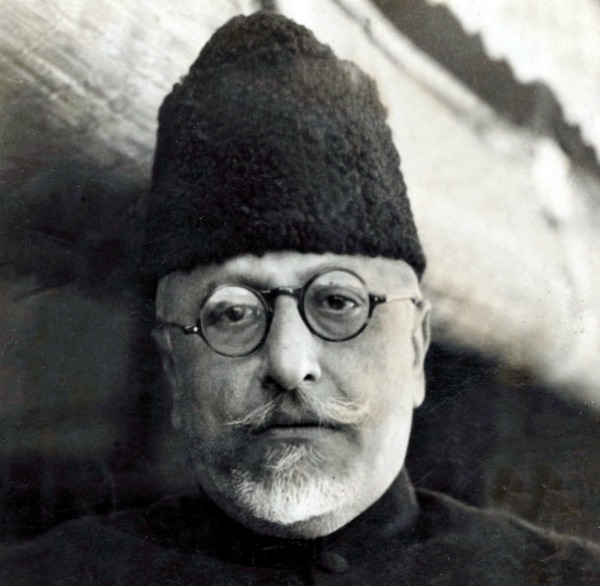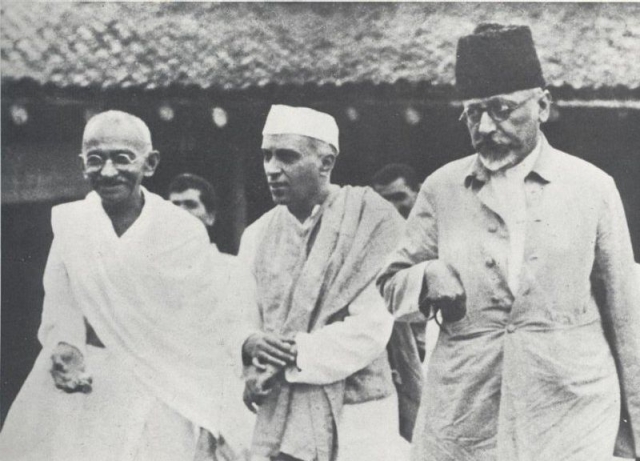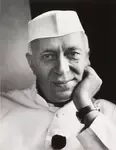- Home
- History of India
- Indian Independence movement
- Maulana Abul Kalam Azad
Maulana Abul Kalam Azad
Maulana Abul Kalam Azad:
Quick Facts:
Name: Maulana Abul Kalam Azad
Country: India
Date of Birth: 11th November 1888
Place of Birth: Mecca
Death: February 22nd 1958
Association: Indian National Congress.
Award: Bharat Ratna
Parents: Muhammad Khairuddin (Father) and Alia Muhammad Khairuddin (Mother).
Maulana Abul Kalam Azad was the first Education minister of Independent India. He was a prominent leader in the fight against the British in India. During India Freedom struggle movement Azad played a very important part in making India free from the hands of British.
He was a noted scholar, activists, poet and
educationalist. His birthday is celebrated as National Education Day in India
due to his efforts in establishing the education foundation in India. In 1923 he became the youngest President of
Indian National Congress. Posthumously in the year 1992, India honoured this
great leader with Bharat Ratna award which is the highest civilian award in
India.
Early Life and Education
Abul kalam was born on 11th November 1888 at Mecca. His father was Muhammad Khairuddin and mother was Alia Muhammad Khairuddin. Earlier Azad was known as Sayyid Ghulam Muhiyuddin Ahmed bin Khairuddin Al Hussani. Mecca is a pilgrimage place for Islam religion.
His
father was a scholar; he left India during Sepoy mutiny and settled in Mecca.
His father had many followers and he did write around 12 books. His mother was
daughter of rich Arabian Sheikh. His forefathers came to India and settled in
Delhi during Mughal period.
Coming from the family of scholars Azad was always inclined towards learning and education. Since he was interested in learning languages he learnt many languages like Urdu, Hindi, Persian, Bengali, Arabic and English. Maulana later had his education in philosophy, geometry, mathematics and algebra. He did self study and home schooling till lower education and for higher education Maulana hired tutors for his higher education.
At a very young age when Maulana was just
fourteen years he contributed his writings to a literary magazine called as
Makhzan. He also published a poetical journal called Nairang-i-Aalam and also
was an editor to Al Misbah at the age of 12 years. He also started a monthly
magazine in 1903 called as Lissan-ul-Sidq. At a very young age of just thirteen
Maulana was married to Zuleikha Begum.
Literary Works of Maulana Abul Kalam Azad
Maulana was considered as one of
the great Urdu writer and scholar. He has written many books, some of the
important books are India Wins Freedom, Ghubar-e-Khatir, Tazkirah, Tarjumanul
Quran. Ghubar- e-khatir is considered as most important book which was written
between1942-1946. It consists of 24 letters written to his friend which were
never posted as Maulana was imprisoned during this period.
Revolutionary activities
Maulana Abul Kalam azad strongly
criticised the British rule of racial discrimination in India. He asked all the
citizens of India of all religions to come together to fight against British.
He even criticised and rejected the Muslim league’s suggestion of communal
separatism. Azad while travelling abroad met many leaders in Egypt like Mustafa
Kemal Pasha and in Iraq some eminent Sunni leaders which made him to change his
opinion on nationalism.
He openly criticised the Muslim
leaders who pressed for partition without focusing on national interest.
Maulana Abul Kalam Azad started a weekly Urdu weekly called as Al-Hilal in 1912. The weekly played a very important
part in getting Hindu Muslim unity back after the Minto Morley Reforms. The
weekly became very popular and close to 26,000 copies of it were sold all over
India. On seeing the patriotism growing British government banned the weekly in
1914.
Determined to fight against racial discrimination and against British Maulana Azad started another weekly after few months known as Al-Balagh. The journal was in support of national causes and for the unity of the people to fight against British.
The British government filed in
controlling Azad from writing. They deported Azad to Calcutta in 1916 and later
did house arrest of Azad in Bihar. He was under detention till 1919 and was
later released in 1920. After that Azad became a full fledged political leader
to fight against British in India.
Pre Independence Movement
Azad respected and followed the
policies of Mahatma Gandhi. After his release from jail in 1920, Azad became an
active freedom fighter with the non cooperation movement. Indians were not
happy and were angered with the passing of Rowlatt act and the Jallianwala Bagh
massacre.
After the civil disobedience and the Kedha and Champaran, Gandhiji could not resist any more. He supported the Khilafat movement to bring unity between Muslims and Hindus. He travelled all over the country giving speeches and organising many events for freedom movement.
Azad was made the president of All India Khilafat committee. When Azad
was again arrested he along with Khilafat leaders namely Dr Muktar Ahmad Ansari
and Hakim Ajmal Khan became more close to Mahatma Gandhi and founded Jamia
Millia Islamia institution for higher education in Delhi.
He also became close to
Chittaranjan Das, Jawaharlal Nehru and Subhas Chandra Bose. In 1923 he became
the youngest President of Indian National Congress. He was firmly attached to
the principles of Mahatma Gandhi. After the conclusion of Dandi March, Azad and
other freedom fighters started a nonviolent protest known as Dharasana salt
works.
When Jinnah and Muslim league adopted a resolution for two nation theory during Quit India Movement, Azad spoke against Jinnah’s theory of two nation theory and rejected his proposal.
He requested all fellow Indians both Hindus and Muslims to maintain unity and
keep India united. On 9th August 1942 Azad was again arrested for
his strong speech at Gowalia Tank in Mumbai given on 7th August
1942. Azad and other members were arrested at a fort in Ahmednagar. By 1946
Azad and other leaders who were imprisoned by British were released.
Post Independence Activities
Maualana Abul Kalam Azad tried his level best to stop the partition but could not do it. When the partition of India happened on 15th August 1947, there was huge violence across the country.
Azad was very hurt and disturbed with the violence; he took
personal responsibility and toured affected places in Bengal, Bihar, Assam and
Punjab. He saw to it that various refugee camps were set up at the affected
areas along with providing food and other basic requirements. He worked closely
with the then Prime minister Jawahar Lal Nehru for making important national
policies.
He became the first Education
Minister for Independent India. Azad worked hard to give education to rural
boys and girls by taking up various measures like free and compulsory education
to all children up to the age of 14 years. He helped in setting up of Central
Institute of Education in Delhi which is now a Department of Education of
University of Delhi.
Under his guidance and leadership
ministry of Education established first Indian Institute of Technology in 1951
and University Grants Commission in 1953. Maulana Abul Kalam Azad worked very hard
before and after Independence of India for the up liftment of the country. His
contribution to India’s development and education are immense.
Contribution towards education
As first Education Minister of Independent India, Azad has contributed hugely for betterment of education system in our country. He is considered as one of the founding fathers of Jamia Millia Islamia. Many colleges and universities are opened in his name to mark a respect to this great leader. His birthday on 11th November is celebrated as National Education Day in India.
Jawaharlal
Nehru referred to this great leader as Mir-i-Karawan which meant a “brave and
gallant gentlemen”. Mahatma Gandhi praised him as a “calibre of Phythagoras,
Aristotle and Plato”.
Death
On
22nd February 1958 Maulana Abul Kalam Azad took his last breath and
very sad and unfortunate day for India. For his invaluable contribution both
pre and post independence Maulana Abul Kalam Azad was awarded with Bharat Ratna award posthumously in the year 1992
which is the highest civilian award in India.
Update on coronavirus in India
Affiliate Disclosure:
If you make any purchase via a link on this site, I may receive a small commission with no added cost to you.













